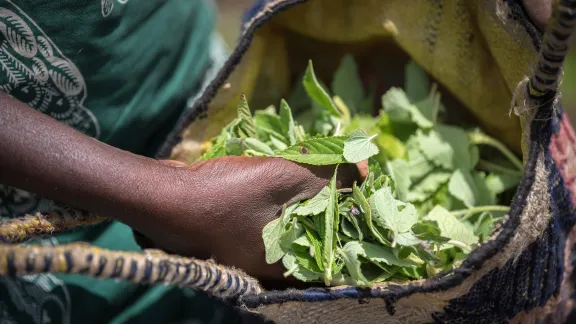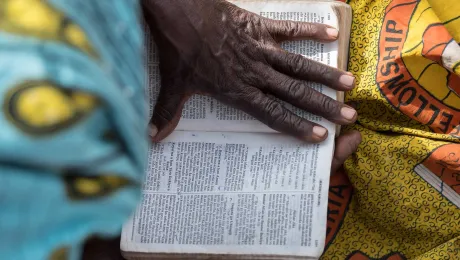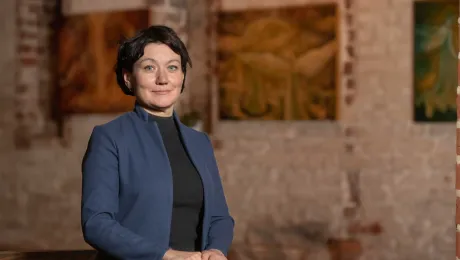
Sali Farimatou Bouda shows a basket full of 'Bolo leaf' (Sesame) which she has picked to add flavour as she cooks meat and fish. Farimatou is one of a group of CAR refugees trained by the Lutheran World Federation in modern farming techniques in Cameroon. Photo: LWF/Albin Hillert
Strategically building towards sustainable community-based solutions
(LWI) - In three years, refugees transformed a desert landscape in Minawao, Cameroon into a luscious green oasis with the support of the Lutheran World Federation (LWF) Department for World Service (DWS) and the United Nations High Commissioner for Refugees (UNHCR).
“We have shade from the sun, the soil has improved and the trees attract water.” said Lydia Youcoubou, a Nigerian refugee. Over 70,000 refugees settled in Minawao to escape Nigeria’s Boko Haram insurgency. Cameroon also hosts refugees from the Central African Republic (CAR) and is home to a large number of Internally Displaces Peoples (IDPs).
With over 360,000 trees planted, the community has already built a large percentage of the great green wall that would be 8,000 kilometers long. In addition to reforestation and awareness raising the LWF works with the UNHCR to address many of the ongoing challenges.
We have shade from the sun, the soil has improved and the trees attract water.
“We have set up a strategy with UNHCR to promote alternative energy sources like eco-friendly briquettes.” said Abdul Aziz, the LWF Project Coordinator.
“Beyond the energy and environmental aspects, eco-friendly charcoal provides women with an income source as they sell to refugees and local communities. This strengthens their economic power and creates cohesion as they work together” said Clovis Mwambutsa, the LWF Regional Program Coordinator.
The LWF has been in Cameroon since 2014 to respond to internal needs caused by crises and conflicts in neighboring countries. In 2020, the country program provided 243,634 individuals with access to water, sanitation and hygiene (WASH), education and vocational training as well as livelihood opportunities. At the same time, social cohesion and conflict prevention activities ensure the sustainability of these achievements.


